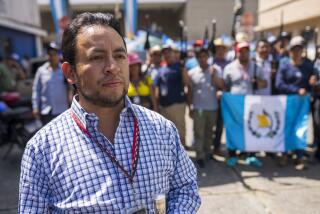Peace Talks to Start in Mexico Between Rebels, Government : Revolt: Insurgents’ demands for land and water threaten elite. National political reform may be topic.
SAN CRISTOBAL DE LAS CASAS, Mexico — Talks aimed at peacefully ending a seven-week Indian uprising are scheduled to begin today in this city’s colonial cathedral.
One of the four oldest temples in the Americas and once the church of 16th-Century activist for Indian rights Fray Bartolome de las Casas, the site symbolizes the issues that rebels and a government negotiator have agreed to discuss.
Centuries of poverty and repression in Chiapas, Mexico’s most southern state, are expected to lead the agenda. The rebels have also insisted on talking about national political reform, although government peace negotiator Manuel Camacho Solis has said he will not make a commitment on that touchy subject.
To strengthen their demands for serious discussion of national issues, the rebels invited the country’s political parties to attend the talks. Six have accepted.
“I understand that decades of demands cannot be resolved at one fell swoop, but I know that with great effort and honesty, advances can be made,” Camacho said recently.
Beyond funneling more money into the state, as the government has already pledged to do, it was not clear what Camacho is prepared to offer.
Rebel demands for more land and water directly conflict with the interests of a powerful ruling elite that has unabashedly supported the Institutional Revolutionary Party, Mexico’s ruling party for more than six decades. They also could put pressure on environmental efforts to protect the Lacandon, North America’s last rain forest.
However, government priorities have shifted rapidly since New Year’s Day, when thousands of well-organized Indian guerrillas took control of several towns, including this one, and declared war on the Mexican army.
During the next 11 days, more than 100 people were killed in confrontations between the rebels and the army. Investigations by international human rights organizations led to accusations of army abuses of civilians and suspected rebels.
The government called a unilateral cease-fire on Jan. 12 and has been seeking talks ever since.
Camacho and mediator Samuel Ruiz, bishop of San Cristobal de las Casas and a well-known Indian-rights activist, arrived at the cathedral Sunday morning in Red Cross ambulances with at least 18 rebel delegates.
All the delegates were masked and armed. About half were dressed in the rebel uniform of dark pants and shirt and a red bandanna. The others wore traditional Indian clothing.
The delegation included Sub-commander Marcos, the masked rebel leader who is the voice of revolution in southern Mexico.
For the talks, Camacho said, the cathedral was ringed by three “circles of neutrality” formed by International Red Cross and Mexican Red Cross representatives and other non-governmental groups. Unarmed military police formed a security cordon around them.
More to Read
Sign up for Essential California
The most important California stories and recommendations in your inbox every morning.
You may occasionally receive promotional content from the Los Angeles Times.










